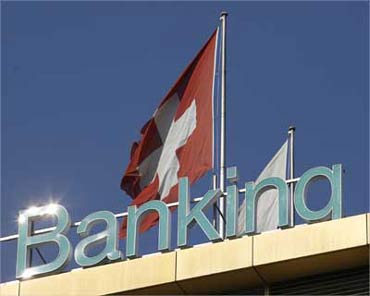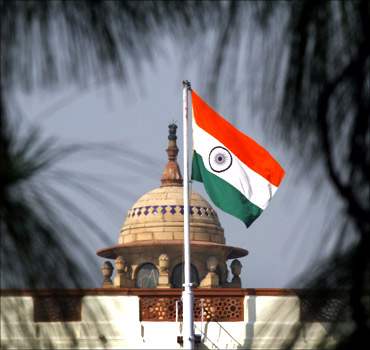Photographs: Reuters
In a move that could help India track black money, Switzerland on Tuesday relaxed norms for sharing information on secret bank accounts of overseas tax offenders by allowing varied modes of identification.
At present, only name and addresses are accepted as valid identity modes.
The changes were made by the finance ministry "through a revision of Requirements for Administrative Assistance in Tax Matters," said an official from Bern, Switzerland.
The Indian government is facing intense pressure from the Opposition, as well as from the courts, to get tough against those who have illegal stashed money in foreign countries, especially in nations that have strict secrecy laws.
. . .
Black money: Swiss relax rules to share info
Photographs: Reuters
The Swiss parliament is debating a treaty between India and Switzerland to pave the way for authorities in Switzerland to seek details of illicit wealth stashed away by Indians in Swiss banks.
As per the existing practice, the foreign country having an information exchange-facilitating treaty with Switzerland can get help from the Swiss government after providing the name and the address of the suspected tax offender, as also as details of the bank concerned.
As per the revision, 'other means of identification should also be admissible in the future'.
While Switzerland has not clarified what 'other means' of identification modes would be admissible, the Swiss Federal Department of Finance said that 'identification via a bank account is also a possibility'.
. . .
Black money: Swiss relax rules to share info
Photographs: Uttam Ghosh/Rediff.com
But Switzerland will not permit any 'fishing expeditions', or allowing foreign countries to trawl through Swiss bank accounts in hope of finding something of their interest.
The Swiss finance ministry said: "Care should be taken in these cases to ensure that a fishing expedition is not involved. Fishing expeditions continue to be impermissible."
To bring this revision into effect, the administrative assistance provisions in double taxation agreements between Swiss and other governments would have to be revised.
In the double taxation avoidance agreement negotiations up to now, including the one with India, the name and the address of not only the person, but also the bank is needed in administrative assistance requests.
. . .
Black money: Swiss relax rules to share info
Photographs: Reuters
Besides, the ongoing parliamentary debate in Switzerland on 10 treaties, including the one with India, it has been said that 'administrative assistance should be permitted only if the name and address of the person and the information holder concerned are indicated in the request'.
Therefore, the fresh revision would also need to be submitted to parliament, said the Swiss finance ministry, adding that it would be done at the 'first opportunity'.
Earlier, the Swiss banks had said that any information exchange would be as per the conditions laid out by the Organisation for Economic Cooperation and Development, the grouping of mostly developed nations.
These conditions have been laid out by the OECD in its model tax convention that governs the tax information exchange agreements between the signatory countries.
. . .
Black money: Swiss relax rules to share info
Photographs: Reuters
The OECD conditions require foreign authorities seeking specific Swiss bank account details to furnish the identity of suspected offenders, details of the alleged offences along with facts to undermine the suspicion, name of the bank concerned and the branch in Switzerland and a written request from the foreign country's tax agency.
Besides eliminating any obstacles to the effective exchange of information in tax matters, the revision has also been conducted to reduce the risk of failure in the peer review process - an international mechanism for comparing implementation of global standards on information exchange and tax matters.
In the first phase of peer review of Switzerland by the Global Forum on Transparency and Exchange of Information for Tax Purposes, it was found that Switzerland's requirements for administrative were too restrictive and could prove to be a possible hindrance to an effective exchange of information.
Despite their revision, 'identifying the taxpayer and the holder of the information (bank) is an indispensable prerequisite for the granting of administrative assistance', it said.







article